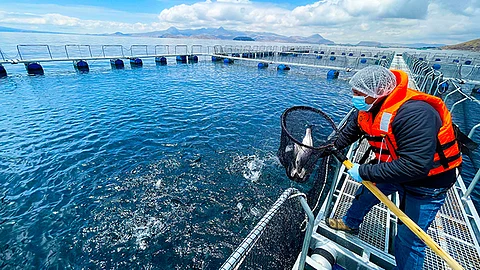

By the end of 2025, Sanipes expects to double the current number of sanitary clearances.
Photo: Produce.
Last April, Peru updated its fishing and aquaculture regulations to ensure greater legal security to operators and marketers, including the necessary hygiene controls. To help carry out these controls effectively, the Peruvian Ministry of Production (Produce) has now announced advances in the sanitary certification of fishing and aquaculture operators.
During the first half of 2025, and through the Peruvian National Authority for Sanitary Certification in Fishing and Aquaculture (Sanipes), Produce granted a total of 1,090 sanitary clearances to fishing and aquaculture operators in 20 regions of the country. This represents a 53.09% increase over the same period last year.
"The effort to provide adequate sanitary conditions to the actors in the sector is a decision of this Government," pointed out the Vice Minister of Fisheries and Aquaculture, Jesús Barrientos. "Public health and the quality of our marine products go hand in hand with the formalization and strengthening of national fisheries and aquaculture," he added.
Peru's Ministry of Production claimed that this advance allows more fishermen and fish farmers to have optimal conditions to develop their activities of extraction, transport, and processing of hydrobiological resources.
In addition, Produce also highlighted that, thanks to this certification, not only is the safety of the products guaranteed, but it also contributes to improving the quality of life of 7,630 families and more than 109,000 potential consumers in Peru.
Of the total number of permits granted between January and June, 718 corresponded to artisanal vessels, 290 to transport vehicles, and the rest to processing plants, landing sites, warehouses, aquaculture centers, aquariums, and other vessels.
The Ministry of Production also reported that the regions with the highest number of certifications were Piura with 311, Lima with 151, Arequipa with 137, Moquegua with 128, and Lambayeque with 116.
Produce also said that Sanipes plans to deliver 1,058 additional sanitary clearances in the second half of the year, which means that by the end of 2025, a total of 2,148 certifications will be achieved.
Since its creation, the Peruvian National Authority for Sanitary Certification in Fishing and Aquaculture has granted 21,892 certificates, of which 15,063 remain in force.
These sanitary certifications are in addition to the training of almost 5,000 artisanal fishermen and fish farmers -specifically 4,977- which, through the National Fisheries Development Fund (Fondepes), Produce also carried out during the first half of 2025.
"The message is clear: Peru's fisheries and aquaculture will only be sustainable if they are safe, responsible, and formal. For this reason, we will continue to promote access to these authorizations throughout the country," concluded Vice Minister Barrientos, highlighting the Peruvian government's commitment to the long-term sustainability of the country's hydrobiological resources.
